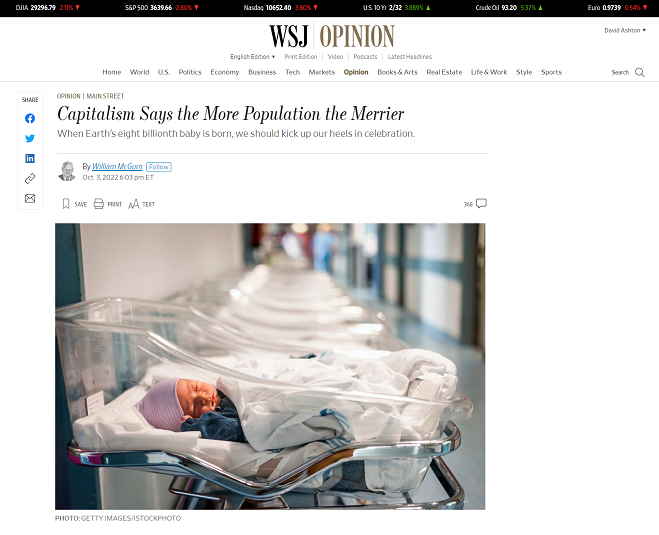When Earth’s eight billionth baby is born, we should kick up our heels in celebration.
I was pointed to this article today by Dan Bongino podcast, see extract of episode 1868 below. It is interested that Bill Gates and his tyrants at the WEF believe the world is overpopulated, and is currently trying to kill us "useless eaters" so our population is reduced to 500 million.
We have news for Bill and Co. It Ain't Gonna Happen.
David Ashton webmaster
By William McGurn Oct. 3, 2022 6:03 pm ET
Are human beings good?
Not in the sense of whether they behave decently, but in the more elementary sense of whether a newborn baby is cause for celebration or a carbon-generating curse. It’s a timely question, with the United Nations reporting that the stork will deliver planet Earth’s eight billionth person next month.
Never have so many been alive at one time, and some seem pretty sour about it. Take Liu Zhenmin, U.N. undersecretary general for economic and social affairs, who warned in a press release announcing the expected birth: “Rapid population growth makes eradicating poverty, combatting hunger and malnutrition, and increasing the coverage of health and education systems more difficult.”
Tesla and SpaceX CEO Elon Musk has a more positive view, even warning that civilization itself will “crumble” without more babies. “There are not enough people,” he said to a Wall Street Journal audience in December. He added that many “smart people” falsely believe the world is overpopulated and urged them to look at the numbers.
Now Marian L. Tupy and Gale L. Pooley have done just that. In “Superabundance,” their new book published by the Cato Institute, Messrs. Tupy and Pooley find empirical support for Mr. Musk’s more-the-merrier outlook. More people, they say, means not only a bigger economic pie—but more minds to think up more solutions for more of the world’s problems.
“The book will affirm the moral and practical value of every additional human being, leave you appreciative of the abundance that you are enjoying today, and even hopeful about the future fate of humanity,” the authors write. Capitalism, they posit, succeeds not only because it is efficient but because it correctly locates the source of wealth in the human mind.
Their argument builds on the life’s work of Julian Simon, who features prominently in “Superabundance.” Simon was a University of Maryland economist (and contributor to these pages) who wrote a revolutionary 1981 book called “The Ultimate Resource.” A physical resource traditionally considered a source of wealth (e.g., oil), he observed, is valuable only because of the uses to which the human mind puts it.
“Superabundance” challenges today’s orthodoxy that resources are finite. Messrs. Tupy and Pooley invoke the notion of “time price,” or how long it takes to earn the money necessary to buy an item, to show that things are getting cheaper—which wouldn’t happen if resources were becoming more scarce. A factory worker in 1850, for example, had to work two hours and 50 minutes to buy a pound of sugar, while his counterpart today has to work only 35 seconds. Multiply that by similar gains in hundreds of other resources and commodities, and the result is “superabundance.”
But it isn’t only about having more stuff. It’s a metaphysics of wealth. The book’s fundamental claim is that by almost any measure you care to choose—health, life expectancy, education, daily caloric intake—we are living in what Simon once described to me as an “epidemic of life.” And it’s all because of human creativity.
Alas, there’s something about wealthy societies that draws them to pessimism. In Simon’s day, it was the idea that we were running out of farmland, or that overpopulation was outstripping the world’s “carrying capacity.” Though Simon won that debate—“the battle to feed all humanity” wasn’t over, as Paul Ehrlich foolishly asserted in the first sentence of his 1968 book “The Population Bomb”—the battle has simply assumed a different form.
Messrs. Tupy and Pooley describe the shift in argument as “the intellectual pilgrimage from worrying about running out of resources to worrying about running out of nature.” In this view, critics concede capitalism’s ability to produce the goods, but argue that this productive capacity itself is speeding us to our destruction. What use is everyone’s being able to afford a car if the price is making the climate unlivable?
But, the authors argue, it isn’t only that we produce more. It’s that we produce more in smarter ways, using fewer resources, and then using them in ways less harmful to the environment. The reason for this is, again, what humans produce best: ideas. Men and women are more than mouths, they are minds too—and it’s time to reject the absurd calculus by which a country is said to get richer when a farmer’s cow gives birth to a calf but is poorer when a mother delivers a child.
So when that eight billionth child is born on Nov. 15, we should kick up our heels and celebrate, perhaps with a tart reading from “Superabundance.” And amid all the warnings that we are running out of this or that, remember that when a gloomy Anglican cleric named Thomas Malthus first started declaring the Earth would never be able to feed its people, the population was only one billion.
Write to mcgurn@wsj.com.
